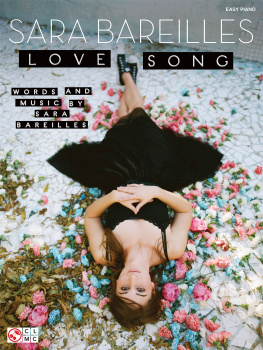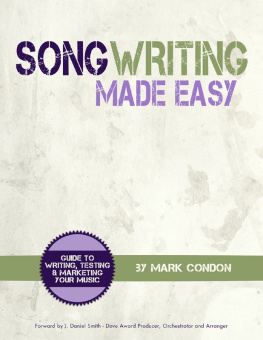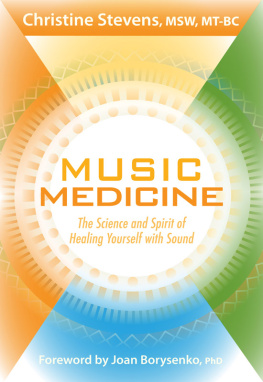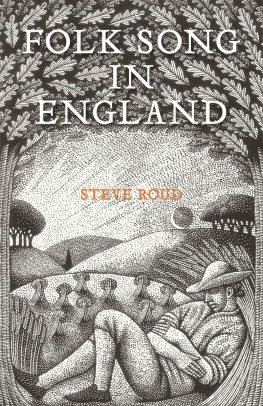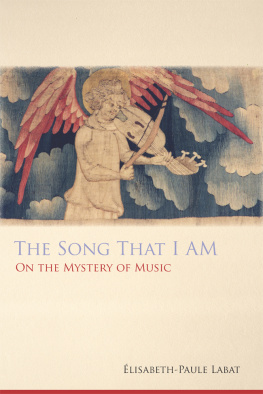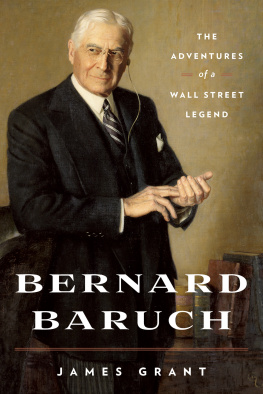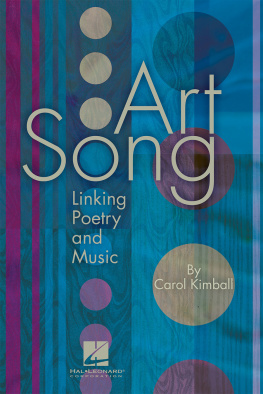Elena Mannes - The Power of Music: Pioneering Discoveries in the New Science of Song
Here you can read online Elena Mannes - The Power of Music: Pioneering Discoveries in the New Science of Song full text of the book (entire story) in english for free. Download pdf and epub, get meaning, cover and reviews about this ebook. year: 2011, publisher: Walker Books, genre: Art. Description of the work, (preface) as well as reviews are available. Best literature library LitArk.com created for fans of good reading and offers a wide selection of genres:
Romance novel
Science fiction
Adventure
Detective
Science
History
Home and family
Prose
Art
Politics
Computer
Non-fiction
Religion
Business
Children
Humor
Choose a favorite category and find really read worthwhile books. Enjoy immersion in the world of imagination, feel the emotions of the characters or learn something new for yourself, make an fascinating discovery.

- Book:The Power of Music: Pioneering Discoveries in the New Science of Song
- Author:
- Publisher:Walker Books
- Genre:
- Year:2011
- Rating:4 / 5
- Favourites:Add to favourites
- Your mark:
- 80
- 1
- 2
- 3
- 4
- 5
The Power of Music: Pioneering Discoveries in the New Science of Song: summary, description and annotation
We offer to read an annotation, description, summary or preface (depends on what the author of the book "The Power of Music: Pioneering Discoveries in the New Science of Song" wrote himself). If you haven't found the necessary information about the book — write in the comments, we will try to find it.
Elena Mannes: author's other books
Who wrote The Power of Music: Pioneering Discoveries in the New Science of Song? Find out the surname, the name of the author of the book and a list of all author's works by series.
The Power of Music: Pioneering Discoveries in the New Science of Song — read online for free the complete book (whole text) full work
Below is the text of the book, divided by pages. System saving the place of the last page read, allows you to conveniently read the book "The Power of Music: Pioneering Discoveries in the New Science of Song" online for free, without having to search again every time where you left off. Put a bookmark, and you can go to the page where you finished reading at any time.
Font size:
Interval:
Bookmark:
_fmt.jpeg)
Copyright 2011 by Elena Mannes
Foreword copyright 2011 by Aniruddh D. Patel, Ph.D.
All rights reserved. No part of this book may be used or reproduced in any manner whatsoever without written permission from the publisher except in the case of brief quotations embodied in critical articles or reviews. For information address Walker & Company, 175 Fifth Avenue, New York, NY 10010.
Published by Walker Publishing Company, Inc., New York
Whale Sing by Scott McVay reprinted by kind permission of the author.
LIBRARY OF CONGRESS CATALOGING-IN-PUBLICATION DATA
Mannes, Elena.
The power of music : pioneering discoveries in the new science of song / by Elena Mannes ;
foreword by Dr. Aniruddh Patel.
p. cm.
Includes bibliographical references.
ISBN 978-0-8027-1996-6 (hardcover)
1. MusicPsychological aspects. 2. Music and science. I. Title.
ML3830.M19 2011
781.11dc22
2010048255
First published in the U.S. by Walker Publishing Company in 2011
This e-book edition published in 2011
E-book ISBN: 978-0-8027-7829-1
Visit Walker & Companys Web site at www.walkerbooks.com
TO MY PARENTS
Leopold Damrosch Mannes
and
Evelyn Sabin Mannes
with love and gratitude
CONTENTS
by Aniruddh D. Patel, Ph.D.
Introduction:
CHAPTER 1
CHAPTER 2
CHAPTER 3
CHAPTER 4
CHAPTER 5
CHAPTER 6
CHAPTER 7
CHAPTER 8
CHAPTER 9
CHAPTER 10
CHAPTER 11
CHAPTER 12
CHAPTER 13
The power of music to engage human minds and stir the emotions has fascinated thinkers for thousands of years. Well over two thousand years ago Plato remarked that rhythm and harmony find their way into the inward places of the soul. Despite this ancient interest, it is only in the past decade that an organized community dedicated to research on music and the brain has emerged. The youthfulness of this field partly reflects the new technologies that have spurred its growth, including brain-imaging techniques that allow scientists to observe human brains as they perceive or make music. These remarkable tools have quickly revealed that there is no single music center in the brain. In fact, it seems that each subcomponent of music (e.g., harmony, rhythm, etc.) engages a broad network of brain regions, so that music as a whole has access to vast portions of our brains.
This sea change in the scientific study of music has rekindled many old questions about music and the mind. Why does music have such strong effects on our emotions? Is music a universal language? Why does music often make us want to move and dance? How does music get so deeply embedded in our memories? Does learning music improve other cognitive abilities? Can musical activities help restore some of the abilities of neurological patients? These are just a few of the questions that the cognitive neuroscience of music is beginning to address.
One question that has driven much of my own research is: What is the relationship between music and language? In exploring this question, I have found many hidden connections between these two domains. For example, musical and linguistic grammar have many obvious differences, yet research grounded in neuroscience points to significant overlap in the way the brain processes the abstract structure of these two domains. This has opened new ways of studying (and perhaps one day treating) certain language disorders, and illustrates how long-standing debates about music and the mind are being invigorated by new experimental and empirical research.
In her documentary The Music Instinct , and now in this book, Elena Mannes has captured a young field at an interesting point in its development. Her film and book give us a portrait of a young research community. Going behind the scenes and beyond the texts of scientific papers, she lets us hear the voices of scientists who are passionate about their research. Adding much more information than was available in the film, this book ranges across many interesting questions about music and the mind, and provides a colorful introduction to a number of current debates in this field.
To those students who may be considering a career in the scientific study of music and the mind, allow me to encourage you. This is a new field and many big questions remain unanswered or only partly addressed. It is a field that allows one to bridge the study of culture and biology, and to develop significant new theories and rapidly connect these theories to experimental studies. Furthermore, there are increasing opportunities to connect basic research with real-world applications of music in education or medical rehabilitation. If you find yourself attracted to this field, please visit the Society for Music Perception and Cognition (www.musicperception.org) to get information on conferences, student opportunities, journals, videos, and other resources for researchers.
The capacity and proclivity for music is one of the most fascinating aspects of being human. As the study of music and the brain expands in this new millennium, prevailing ideas will change and new theories will evolve, but one thing is certain: This exciting journey is now well under way.
Aniruddh D. Patel, Ph.D.,
Esther J. Burnham Senior Fellow, The Neurosciences Institute; president, Society for Music Perception and Cognition; and author of Music, Language, and the Brain
INTRODUCTION
I would teach children music, physics, and philosophy; but most importantly music, for in the patterns of music and all the arts are the keys of learning.
PLATO
A summer night, an old barn, and music in the air, the melodies and harmonies of amateurs and professionals playing chamber music mingle with the night sounds of crickets through the barns open doors. This is how I first knew music: not as a formal production with remote musicians far up on a stage, but as an intimate, personal creation joining musicians, like my father the pianist, and listeners in the experience.
Music is in my genes. The child of a family of professional musicians, Ive always known the power of music. It was all around me when I was growing upalive in the house at night, in concerts, and in recordings. From earliest childhood, I was aware of my parents and their friends passion for this art form. Music informed our life and the moments that live in my memory. When I now listen to certain pieces, I can still hear the music of that chamber group from my childhood or be transported to my teenage years, driving down a country road with folk or rock music blasting from the radio.
I am not a professional musician, but Ive always felt that music is an inextricable, inborn part of me. I have wondered if thats true for everyone, and as a documentary producer/director, I wanted to explore that central question. Within the last decade, there has been an explosion of interest in the science of music, and a new generation of scientists has developed the tools to discover the intimate connections between music and human life. The resulting discoveries reveal hard evidence that music truly is a fundamental aspect of life, something that defines us and binds us together as humans. We are now creating a future in which music will be recognized as a force far more significant than mere entertainment. Some scientists call the potential use of music for healing, changing behavior, and understanding our origins and our universe the stuff of science fiction; imagine prescribing music for neurological disorders and as treatment for the aging brain. Yet our new knowledge offers significant and often startling conclusions about music and the natural world and has major implications for the future of education and medicine.
Next pageFont size:
Interval:
Bookmark:
Similar books «The Power of Music: Pioneering Discoveries in the New Science of Song»
Look at similar books to The Power of Music: Pioneering Discoveries in the New Science of Song. We have selected literature similar in name and meaning in the hope of providing readers with more options to find new, interesting, not yet read works.
Discussion, reviews of the book The Power of Music: Pioneering Discoveries in the New Science of Song and just readers' own opinions. Leave your comments, write what you think about the work, its meaning or the main characters. Specify what exactly you liked and what you didn't like, and why you think so.


